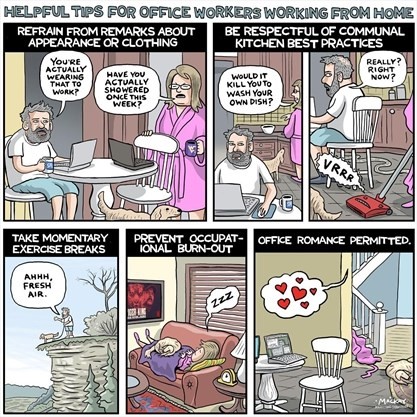How to be present while working remotely
Contributed by Vishwanath Baba, Professor, Human Resources & Management
How many times have you gone into work when you’re really not up to it?
Presenteeism is when you are physically present at work but functionally absent. It describes an employee who works when perhaps they shouldn’t. They are not fully functioning due to an illness, extreme family/life pressures, or stress. Many continue to work because they have a deadline to meet, expectations to fulfill, or feel a sense of obligation to their boss and colleagues. They have other things on their mind and are not focused on their tasks. Presenteeism occupies the grey area between total work engagement and complete absence.
How is presenteeism evident when working from home?
Many employees are now working from home during the COVID-19 pandemic. They still have deadlines to meet, expectations to fulfill, and projects to complete. They are not directly visible in this newly defined workspace. If they are unwell, they can take time off to recover without social consequences. But everyone may be afflicted by presenteeism of a different sort. It is easier to be distracted when there is no one to enforce social control. When working from home, people are sharing spaces with others who have different interests or responsibilities. The challenge is how not to fall prey to presenteeism in remote work.

Editorial Cartoon by Graeme MacKay, The Hamilton Spectator – Saturday March 28, 2020 mackaycartoons.net
Tips on how to fully function when working remotely:
- Create a working environment at home that is conducive to concentration. It is good to have a dedicated space for remote working that does not double as a dining table during worktime. To be productive while working remotely, find a place to isolate yourself and train your brain to recognize when it’s time to work.
- Connect with co-workers remotely and set up regular touchpoints. Work must be intrinsically interesting for us to be fully engaged. Many tasks constitute work, and not all of them are equally interesting. The physical and social context of work often compensates for the tedious parts, allowing for spontaneous exchanges with co-workers that moderates the occasional tedium. It is good to have a fixed time to have virtual meetings for work-related interaction and to chat and share lighter moments.
- For remote work to be productive, one must have a routine. The nature of the work does not change, but everything else does. So, work-life balance becomes essential. We are used to a routine at work. While the specifics vary, the critical components include space, structure, rhythm, schedule, interaction, reward, and discipline.
- Break up your day when working at home. Keep a work schedule that distributes various tasks throughout the day and align work for times of efficiency and creativity. We need structure that stabilizes the workday with a start and finish time that suits our needs, with breaks to recharge, and lunch to reenergize.
- Reward yourself for your dedication to work. Give little rewards for accomplishments achieved during the day. We are social beings, and prolonged isolation is not conducive to robust mental health. The breaks, if carefully planned, can contribute to the enhancement of mental health.
About Dr. Vishwanath Baba
Dr. Vishwanath Baba specializes in stress management, development management, management skill development and management training in the developing world. He has been a consultant to the Canadian International Development Agency, International Development Research Centre, and Swedish International Development Agency. His research interests cover management theory, evidence-based management, work attitudes, employee well-being, stress, depression, burnout, absenteeism, and turnover.


Love the cartoons!!